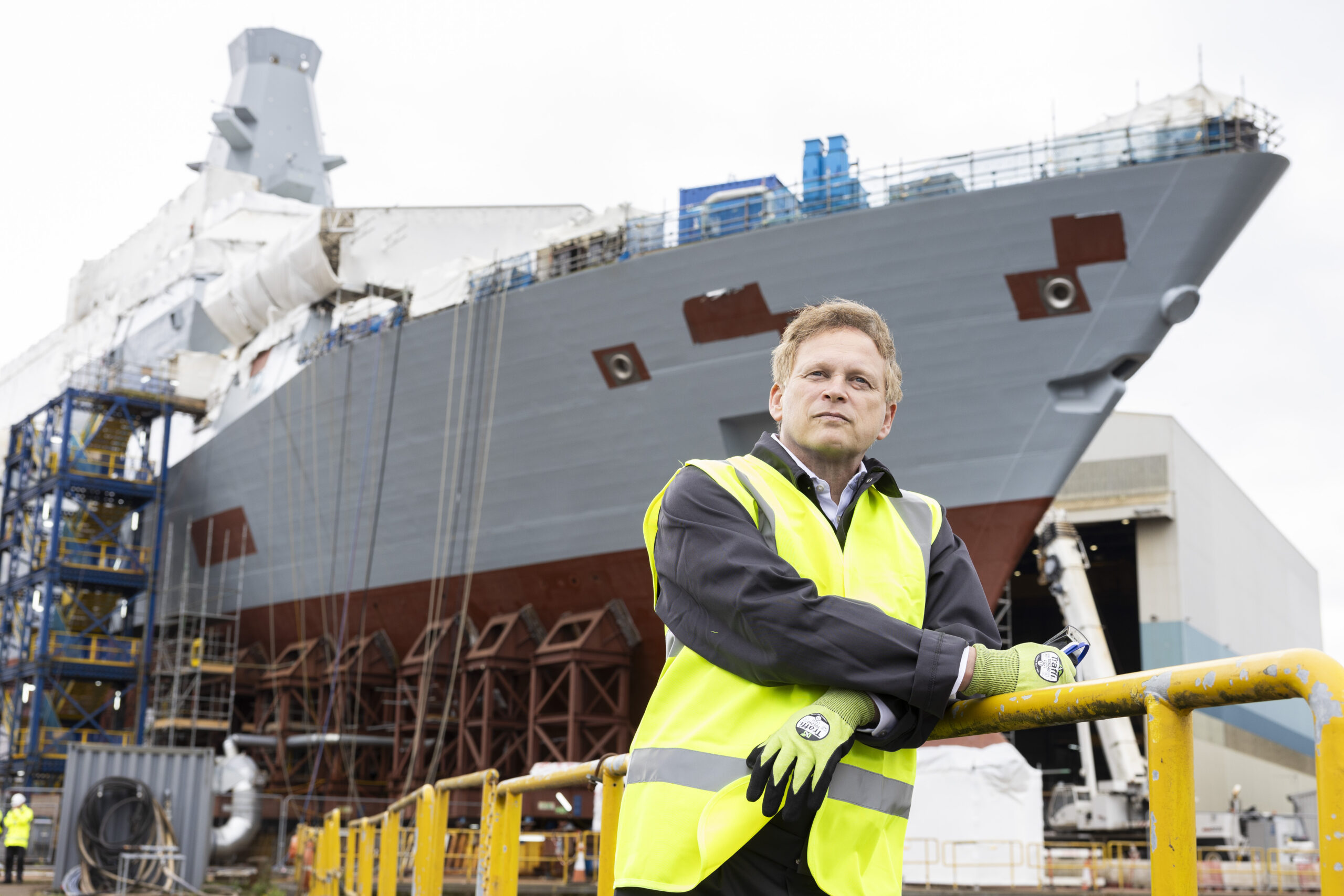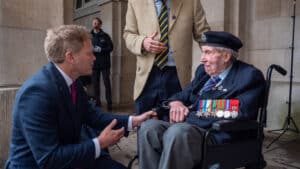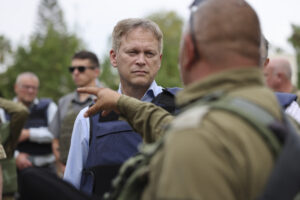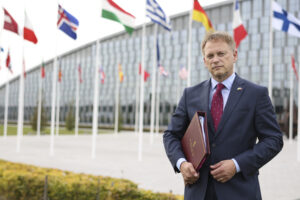 BBC News
BBC NewsBorrowing was £17.4bn last month, the second highest October figure since monthly records began in 1993.

Christopher Jackson interviews one of the most interesting and talented figures in modern politics about Russia-Ukraine, defence spending, and his own career
Grant Shapps is only 20 minutes late for my interview with him, but is nevertheless apologetic when he comes online. I tell him that, given the range of threats in the world today, I don’t mind at all being kept waiting by the Defence Secretary. He laughs: “At least you know we’re on it.”
Throughout our interview, the 55-year-old seems boyish and cheerful. Although one hears a lot about how tired this government is meant to be, my experience tends to be somewhat the opposite: in general, we are presided over now by highly experienced Cabinet ministers who enjoy the jobs they’re in, and who have learned to wear power lightly. They are also determined to use this moment to solve the problems the country is facing.
In the case of Shapps, who has held numerous roles at the top of government, in addition to serving as the MP for Welwyn Hatfield since 2005, the impression is of someone with seasoned nous who knows how to run things.
Shapps begins by telling me about his day: “It’s been busy. It started with the Yemeni Prime Minister which is always going to be an interesting conversation. ‘So about your country which we’re bombing?’ And later today I have my New Zealand counterpart coming – so it’s another day at the MoD.”
The Secretary of State is talking to me on the back of a major victory, having last month secured a 2.5 per cent increase for his department from the Treasury – a decision arrived somewhat against the Treasury’s inclinations. The story, as told by departed minister James Heappey, is that Jeremy Hunt initially offered Shapps’ department the same 2.5 per cent increase but that the money would be spread over the course of two parliaments. For Shapps, who understood the urgency of the need, this was unacceptable and he made it clear that he would rather have nothing than accept such an offer. It was a calculated high stakes gamble, and it paid off.
As a result of this win, Shapps is now in a position to deliver a boost to the economy. The day before I talk with him, he has announced the building of six new amphibious warships in a widely covered speech at the Annual Sea Power conference.

But this, it will turn out, is just the tip of the iceberg. I ask him if the budget increases represent a chance for small businesses to step up? “Massively so,” he replies. “There are 400,000 people involved in the defence sector, in a range of areas from manufacturing to science. Obviously, you’ve got the so-called primes – the BAEs of this world – but actually there’s an enormous supply chain under that and there’s now more opportunities than ever for SMEs to get involved. That’s partly because a lot of what we need now are not the big things like ships – although we do need those, as you saw yesterday. But we also need clever tech – drones, and all the best kit. The two biggest drone companies were start-ups, although I think a couple have been snapped up by the big boys now.”
Meanwhile, as the UK makes these internal deliberations, conflict seems to be a more or less constant aspect of life on this planet. The Russia-Ukraine situation continues to drag on with all the appearance of a miserable stalemate. At the same time, the situation in Gaza continues to feel intractable as it has done throughout most of our lifetimes. If that weren’t enough, many predict that the next theatre of conflict will be in the South China Sea and involve China making a claim on Taiwan.
Shapps has naturally visited all these zones of actual and potential conflict. I ask him what might surprise us if we were to, say, visit Ukraine and see for ourselves. He gives a thoughtful answer. “Last night, I saw the reporting of Jonathan Beale who is the BBC’s Defence Editor. He was wearing a bright jacket next to burned out buildings. He was touring a part of northern Kharkiv. As you look at the ruins on his report, it would be very easy to get the impression that that’s what Ukraine is like.” So it’s different? “In truth, I’ll go to Kiev and it’s a coffee society. You could be in Prague or Paris for the most part, although the scene is regularly dispersed by air raids – but even then, people usually go to the air-raid shelters in not too much of a panic.”

Image of the Secretary of State for Defence Grant Shapps, seen here visiting a Kibbutz with members of the Israeli Defence Force, which was attacked on October 7th by Hamas.
Shapps is anxious not to minimise the overall situation, especially in the East of the country. “Obviously, if you go to Odessa near the Crimea, that’s a different story,” he continues. “When I was last there, I had to call off a visit to Odessa. I discovered that President Zelensky had been 300 metres or so from a Russian missile attack, though I think that was by chance. At the same time, I received notice from Defence Intelligence that the Russians knew I was travelling to Odessa and it seemed an unnecessary risk to take. So clearly there are parts of the country you wouldn’t go to. But there are vast parts of this huge country where you wouldn’t see anything unusual at all, and which have had no physical effects arising out of the invasion.”
This feels an important perspective, and makes one hope that one day the reconstruction of Ukraine won’t be such a daunting project as we sometimes imagine it might be. I also rather like this image of people having coffee in Kiev. Does this make us understand what we might be fighting for? Shapps goes further: “In a sense coffee culture is what we’re fighting for – it’s a way of life. Free peoples in democracies must decide their own futures and not be driven over by terrorists in the case of Palestine – or autocrats in the case of Ukraine.”
Nevertheless, the battlefield in Ukraine continues to feel frustrating. Brooks Newmark, a former MP and minister, who has been heavily involved in helping refugees in war-torn eastern Ukraine, tells me about the crucial tactical nature of the Kerch Bridge. This has been damaged at intervals during the war but so far always rebuilt by the Russians. But if we were to destroy it, Newmark tells me, we would strike a severe blow since it is Russia’s link to its supply lines. Under circumstances where it was damaged beyond repair, then Putin would be brought to the negotiating table.
So why haven’t we done that, one wonders? Newmark tells me that there are two missiles which can destroy the bridge: the German Taurus and the MGM-140 ATACMS-38. Our own Storm Shadows are unfortunately not quite so powerful and able to damage the bridge. When I put this to Shapps, he says: “In actual fact, the Taurus is exactly the same as the Storm Shadows, which have been devastating in the Crimea, and we allowed them to be used. The Germans sometimes talk up the Taurus but it has the same potential to cause damage as the Storm Shadows.” So how can we destroy the bridge? “I can’t really go into too much detail for obvious security reasons but the Kerch is a well-protected bridge – in fact, I can confidently say it’s the best protected bridge in the whole world. It’s not quite as simple as it sounds. Obviously Ukraine will be looking at the supply lines into their occupied country all the time, and how they can disrupt them.”
Newmark is not alone in wondering whether it is time to lay the ghost of Iraq aside and put boots on the ground. Is that something the government would ever consider? Shapps is firm. “Putin absolutely must not win. But we must be crystal clear: we’re not considering putting boots on the ground as that would put NATO at war with Russia which would seem to me to be not a smart move.” He adds, clearly moved by the courage of our ally: “That’s the amazing thing about our brave Ukrainian friends and allies: they’re prepared to do the hard part which is to do the fighting. We need, consistently and reliably, to do whatever Ukraine needs to win this war.”

Image of the Defence Secretary Grant Shapps, seen here at the Yokosuka Naval Base in Japan today (14/12/2023).
The UK has signed an international Treaty with Japan and Italy for a future combat air programme that aims to develop an innovative stealth fighter with supersonic capability and equipped with cutting-edge technology.
Despite this, I can sense that the vacillations by the American Congress who caused significant delays in weapons delivery this year, have been a major frustration, with the war having gone more Putin’s way this year than many would have liked. “Last time I was in Kiev, I was warning that the world has been caught napping: this was two or three months ago during the hiatus over sending weapons,” Shapps recalls. “I saw it as being a real problem. I warned them that we’re sleepwalking into something much worse.” And sadly, much of what Shapps feared has come to pass. “Unfortunately that delay has enabled attacks on Kharkiv which wouldn’t have happened if the package had come sooner. The situation is stretching the Ukrainians but ultimately I’m confident Russia won’t get into Kharkiv in the short run. But it’s an unnecessary distraction and we can’t allow anything like that to happen again. It’s unthinkable for me to have Moscow decide the boundaries and borders of modern European democratic nations.”
Shapps is also firm on the role which Ukraine’s near neighbours have to play. He continues: “But we don’t want Washington to dictate those borders and boundaries either. We want European countries to step up to the plate, and I think the UK has done this. In terms of our own financing package, we’ve gone from £2.3 billion to £2.5 billion to £3 billion. So we’ve been consistent in our approach while also providing increasing funds.”
I ask Shapps a question from the philanthropist and businessman Mohamed Amersi, who wonders how prepared the country is for a potential new theatre of conflict over the China-Taiwan issue. Shapps is keen to link the outcome of the Russia-Ukraine conflict with whatever might be simmering in the Far East: “The best way to prevent an autocrat thinking it’s okay to take over some land that’s not theirs is to make sure Putin doesn’t do exactly that in Europe.” But he also has another point to make: “We have hugely invested in the Indo-Pacific region to make sure we can maintain the world order. For example, until recently we didn’t have AUKUS, which sees the UK, the US and Australia working together to provide nuclear-powered submarines. We also have the Global Combat Air Programme, a joint initiative between Britain, Italy and Japan to develop jointly a sixth generation stealth jet fighter. Thirdly, we have a permanent presence in the Indo-Pacific, both in terms of ships constantly in the area, and the Carrier Strike Group is going back next year. Our purpose in being active in the region is to make it clear that freedom of navigation is non-negotiable and that countries shouldn’t be invading non-democratic countries.”
Carl Hunter, the Chairman of Coltraco Ultrasonics, has observed that the UK’s strategic nuclear deterrent in CASD and its strategic conventional deterrent in UK Carrier & Littoral Strike both depend on SSN submarines, the fleet size of which has been largely configured for the Euro Atlantic. I ask Shapps when the submarine force will be expanded to cater for its equal Euro Atlantic and Indo Pacific commitments and the probability of a maritime war in the South China Sea? Shapps responds: “We don’t comment on our operations there – but I can say that we do operate our subs all around the world. The good news regarding this is that as a result of the announcement of new ships yesterday, we’re increasing that number. But when it comes to our SSN submarines or our Ballistic Missile Submarines (SSBNs), we don’t advertise their locations.”
Turning to the state of the armed forces, I mention to Shapps that recent reports have highlighted that 54 per cent of potential recruits abandoned the Army recruitment process last year. Given the shrinking size of the armed forces by over 7,000 personnel in the last year, what immediate steps is the Ministry taking to improve recruitment and retention during this period of global uncertainty? Shapps is sympathetic to the question: “Recruitment certainly has been a big problem, and applicants have been far too slow to get through the system. However, for that reason, we’re currently working through the 67 recommendations put forward by the Haythornthwaite Review of Armed Forces Incentivisation. Yesterday, when I was talking about the Navy, I was able to announce that we have the fullest training facilities for eight years. More and more people are coming into the programme. We’ll get that turned around.”
Part of the poor retention figures may be to do with poor accommodation. In particular, a concerning report from King’s College London recently exposed the substandard conditions of UK armed forces’ accommodation. With many families living in substandard conditions, I ask Shapps what specific initiatives are planned to upgrade urgently these facilities, and how will these improvements be prioritised in the defence budget? “On the accommodation, I completely agree. This 2.5 per cent that I’ve won is enabling us to do lots of things including the £4 billion into our accommodation to make it lot better.”
These worries also come against a backdrop of worries around pay in the forces, where some argue that pay rises fail to address satisfactorily the scale of current inflation. Again, Shapps is sympathetic but also keen to highlight how much progress has been made: “Inflation has obviously been high, but last year we had the biggest pay rise of anyone in the public service. The lowest paid are getting another 9.7 per cent which is an increase very much designed to recognise that problem. I also think that this is helping to attract more people so we’ve got 10 year highs in terms of our applications for military services.”

Image of the Secretary of State for Defence, The Rt Hon Grant Shapps MP, seen here meeting recruits at Catterick Garrison, North Yorkshire.
Stephen Morgan, an ex-serviceman himself, asks about a recent article in The Guardian referring to the UK’s ‘very limited air defence systems’. He asks whether, in an era of complex and emerging global threats, the Ministry is addressing these critical gaps in our national defence capabilities to ensure readiness against potential aerial threats? Shapps replies: “We have more in that respect than people often realise. For instance, we have Rapid Response Defence Systems. We have some missiles from land, and some missiles from our Type-45 destroyers at sea. We also have other measures in place which I can’t go into because they’re secret. But we’re also in NATO so that we have 31 other countries coming to our defence in the event of an attack which is something that countries like Israel don’t enjoy and that makes a huge difference. That said, I’m working with our European partners on a sky shield approach as well so there’s a lot happening across the board on this.”
That makes me feel safe enough to make the last section of the interview not about the nation’s defence but about him. How is it that he’s managed to hold so many different high-level roles across government? “In my case, I came to Defence via Transport, the Home Office, Business, and Energy so it wasn’t that straightforward,” he laughs, referring to the turbulent transition of power from Boris Johnson via Liz Truss to Rishi Sunak. “But the process of running big things tends to be the same: government departments are all similar. You have a civil service, a permanent secretary and a private office – and then you have mechanisms to get the work through.”
On a day-to-day level, a Secretary of State is confronted with a huge flow of data and Shapps explains that a successful minister will need to learn how to sift that. “The big question when you come into a department is: ‘How do you get your head around everything and understand the subject in the first place?’ Well, I’m not entirely new to any area of public policy, as I’ve been thinking about politics for a long time, so there is that. But I will confess that it is a hell of a lot of reading. I’ve got better over the years, and I learned to speed-read early in my career.”
Everything comes down to time management, Shapps explains: “It’s twice as fast to write and read something as to have people tell you it: people speak slower than you can read, and if they write it down they have to think through what they put in.” He attributes his approach to government to his background. “I think some of this – completely counterintuitively – is because I don’t have a degree or even an A-Level to my name, so I slightly self-educated myself in terms of doing things. I hope that makes me less given to groupthink than some other politicians. If you want to stand out in politics or in any other area of life, you have to have a unique approach, and be able to come to conclusions on your own.”

The Defence Secretary Grant Shapps attends the NATO Ministers of Defence meeting at NATO Headquarters in Brussels.
Given the murders of Jo Cox and Sir David Amess, I mention that many would-be politicians might worry about the safety of becoming an MP. I ask Shapps if it’s a career path he’d recommend to young people? “Well, it’s very sad that we’re talking on the day when the Slovakian prime minister Robert Fico has been shot. We have had killings of MPs, which have been rare but which are nonetheless concerning. In the role of Defence Secretary you have a different level of protection all the time, but I wouldn’t let it put people off. For the most part, we live in a country where guns aren’t as big a thing as they would be in the US, and so the risks are more moderated. Threats seem to come online by social media and I deal with it largely by not reading it. Do have someone reading it, as these things do need to be reported, but it doesn’t need to be you.”
With that he has to go and vote, and I have a moment to reflect that Shapps is an extremely impressive minister, whose story ought to inspire many young people to follow him into politics.